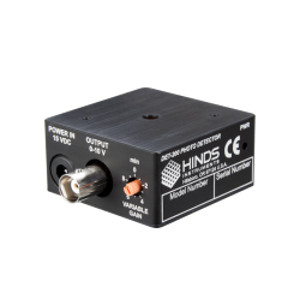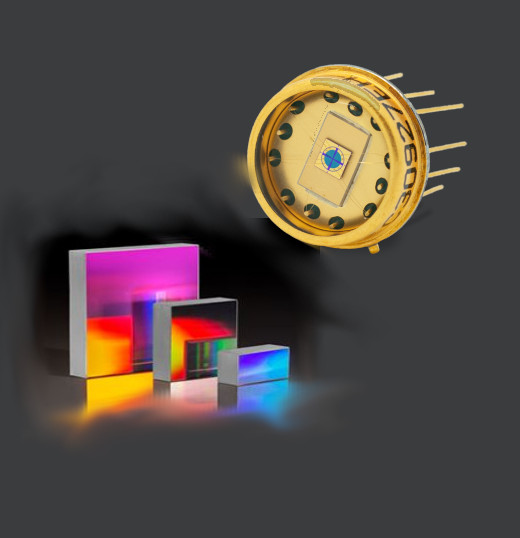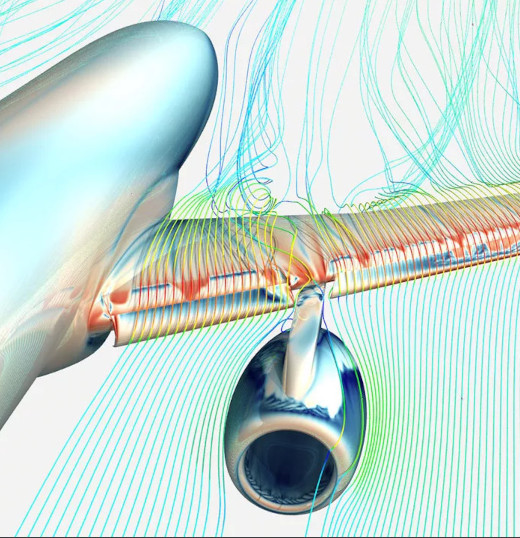Fotodetektor

Oferujemy gotowe systemy jak i komponenty
Fotodetektory silikonowe, germanowe i lawinowe

Hinds Instruments' photodetector modules are specifically designed for use with high frequency optical signals including those generated in Photoelastic Modulator (PEM) applications.
We offer three Photodetector Modules:
- Silicon Photodiode Detectors
- Germanium Photodiode Detectors
- Avalanche Photodiode Detectors
All Hinds PhotoDetectors include these features:
- Frequency Response. DC up to 1 MHz.
- Dark-current and/or Background DC Null.
- Preamplification for Current to Voltage Conversion and Buffering for Impedance Matching to Signal Cables.
- Power Supply included
APD Detector Module include these additional features:
- Fully Adjustable Gain
- Broad Spectral Range, 200-1000nm
- Large Active Area, 19.6mm2
- Low Power/Low Voltage, Bipolar, +/-12V
- Approaches PMT sensitivity
PEM-based optical systems require detectors with a frequency response of at least twice the operating frequency of the PEM. This makes Hinds detection systems ideal for your PEM applications.
For many applications, separate lowpass or DC signals and wide-band AC signals derived from the detector output are required. With the help of the Signal Conditioning Unit, this is possible.
Masz pytania ?
Pobierz kartę katalogową
Silicon photodetectors
Hinds’ detection systems are specifically designed for use with high frequency optical signals including those generated in Photoelastic Modulator (PEM) applications.
Hinds’ detection features include:
- Frequency response of DC to several times the operating frequency of the PEM being used, 400kHz - 1 MHz depending on the model
- The DET-200 maintains a constant bandwidth throughout all gain settings
- Gain Selection, 10 positions
- The DET-200 exhibits a constant DC offset throughout all gain settings
- Offset Voltage (all gain settings), < ± 5mV
- Hi Z load from 0-10V and a 50Ω load from 0-5V
- Power supply included
- Optional standoffs for mounting a precision polarizer mount
The DET-200 dimensions are 2” x 2” x 1” and have a #8-32 tapped hole for post mounting. The following detectors are suitable for signals in the 0.05mW to 5 mW range. For lower signal levels Hinds see avalanche diode photodetector the APD-100.
DET-200 Specifications
Model | Type | Spectral Range (nm) | Active Area | Frequency Response | NEP w/√Hz |
| 2 | Si-PC | 350 - 1100 | 16 mm2 | DC - 1 MHz | 3.55e-12 |
| 4 | Si-PV | 350 - 1100 | 16 mm2 | DC - 1 MHz | 7.99e-12 |
| 6 | Si-PV | 200 - 1100 | 20 mm2 | DC - 400 kHz | 3.77e-11 |
Germanium photodetectors

Hinds’ detection systems are specifically designed for use with high frequency optical signals including those generated in Photoelastic Modulator (PEM) applications.
Hinds’ detection features include:
- Frequency response of DC to several times the operating frequency of the PEM being used, 400kHz - 1 MHz depending on the model
- The DET-200 maintains a constant bandwidth throughout all gain settings
- Gain Selection, 10 positions
- The DET-200 exhibits a constant DC offset throughout all gain settings
- Offset Voltage (all gain settings), < ± 5mV
- Hi Z load from 0-10V and a 50Ω load from 0-5V
- Power supply included
- Optional standoffs for mounting a precision polarizer mount
The DET-200 dimensions are 2” x 2” x 1” and have a #8-32 tapped hole for post mounting. The following detectors are suitable for signals in the 0.05mW to 5 mW range. For lower signal levels Hinds see avalanche diode photodetector the APD-100.
DET-200 Specifications
Model | Type | Spectral Range (nm) | Active Area | Frequency Response | NEP w/√Hz |
| 7 | Ge-PV | 800 - 1600 | 3 mm2 | DC - 1 MHz | 1.17e-11 |
| 8 | Ge-PV | 800 - 1600 | 20 mm2 | DC - 1 MHz | 3.92e-11 |
Avalanche photodetector

Hinds Instruments offers an avalanche diode photodetector module that is optimized for use with the PEM and low light levels. It is less expensive, safer, more rugged and easier to use than a photomultiplier tube (PMT).
The gain is adjustable and the bandwidth is DC to 450 kHz, making it useful for circular dichroism experiments and other polarization measurements that involve small, fast (PEM frequency) signals.
Hinds designed the module using an avalanche photodiode that is sensitive to a minimum 5 microWatt (at maximum gain) signal and is usable from 200 – 1000 nm. While it is not sensitive enough for photon counting, it is well suited for most other applications that previously required a PMT. Unlike a PMT, it does not require the expense or large footprint of a high voltage power supply.
APD-100 Specifications and Output Characteristics
| Spectral Range (nm) | Peak Sensitivity Wavelength | Photodiode Diameter | Effective Active Area | NEP at Response Peak | Frequency Bandwidth (3dB) |
| 200 - 1000 | 620 nm | 5 mm | 19.6 mm2 | 1 pW/√Hz | DC to 450 kHz |
| Output Voltage at Saturation | Min Gain | 1.34 |
| Max Gain | 8.5 | |
| Photoelectric Sensitivity, V/W | Min Gain λ = 620nm | 0.04 x 106 |
| Max Gain λ = 620nm | 2 x 106 | |
| Maximum Input Light Level, uW | Min Gain λ = 620nm | 250 |
| Max Gain λ = 620nm | 5 | |
| Minimum Detection Limit | Max Gain λ = 620nm | 2 nW r.m.s. |
Dostawcy







